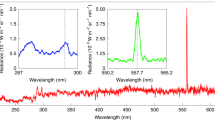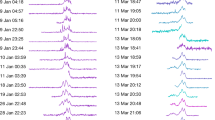Abstract
THE red auroral lines of atomic oxygen at 6300 A. and 6364 A. are known to appear with a delay against other lines. The lag is due to the fact that the excited oxygen atoms are metastable, the lifetime being about 110 sec. 1. The delay of the oxygen 5577 line is for the same reason 0.75 sec. 2. For experimental evidence records made by an automatic direct-recording spectrograph have been used and the variation of the red line due to changes in the luminosity of the aurora is compared with that of the N2 + band 4278 A. The green line 5577 A. may also be used; but on the spectral records this line was too often outside the record, because of over-loading of the amplifier.
This is a preview of subscription content, access via your institution
Access options
Subscribe to this journal
Receive 51 print issues and online access
$199.00 per year
only $3.90 per issue
Buy this article
- Purchase on Springer Link
- Instant access to full article PDF
Prices may be subject to local taxes which are calculated during checkout
Similar content being viewed by others
References
Garstang, R. J., Mon. Not. Roy. Astro. Soc., 111, 115 (1951).
Omholt, A., and Harang, L., J. Atmos. Terr. Phys., 7, 247 (1955).
Author information
Authors and Affiliations
Rights and permissions
About this article
Cite this article
STOFFREGEN, W., DERBLOM, H. Life-Time of the Atomic Oxygen 6300 A. Line in the Auroral Spectrum. Nature 185, 28–29 (1960). https://doi.org/10.1038/185028a0
Issue Date:
DOI: https://doi.org/10.1038/185028a0
Comments
By submitting a comment you agree to abide by our Terms and Community Guidelines. If you find something abusive or that does not comply with our terms or guidelines please flag it as inappropriate.



